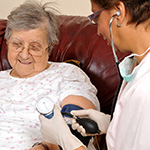Other Useful Resources
Resources for Jewish End-of-Life Care
- Congregation Rodeph Sholom’s “End of Life Preparation and Consolation: A Jewish Guide to the End of Life
- CLAL’s Embracing Life and Facing Death: A Jewish Guide to Palliative Care
- “Halachic Pathway” and Chayim Aruchim (Center for Culturally Sensitive End of Life Advocacy and Counseling)
- Jewish Ritual, Reality and Response at the End of Life
- UJA-Federation of New York Network Agencies Directory
-
Forms / Advance Directives
Planning ahead and making your end-of-life care wishes known often involves important discussions and executing advance directives. Each state has different policies for enabling individuals to guide advanced illness or end-of-life care. Below is a summary of the New York State policies.
The New York Health Care Proxy Law established a form that allows you to appoint someone you trust as a health care agent to make treatment decisions for you if you lose the ability to make decisions yourself. The form provides space for you to specify the types of treatments you want or don’t want and must be signed before two adult witnesses. Your appointed agent must follow these instructions.
For more information on the New York Health Care Proxy Law, visit the New York Department of Health website. These forms are available in various languages: English, Spanish, Chinese and Russian.
You can find links to halachic medical forms below.
- Jewish Medical Directives for Health Care, approved by the Rabbinical Assembly of the Conservative Movement
- Chayim Aruchim Medical Directives
- The Halachic Medical Directive for use in New York State
Please note that New York does not specifically recognize living wills separate from a health proxy. Thus, a living will or other such document by itself may or may not help in determining your treatment wishes in New York.
The Family Health Care Decisions Act authorizes surrogate decision-makers for patients 18 years and older in hospitals or nursing homes who do not have a health care proxy or legal guardian and who never provided evidence of their treatment wishes. The law establishes a prioritized list of who may be appointed as a surrogate to make decisions regarding withholding life-sustaining treatment. Highest priority goes to a spouse or domestic partner, then to an adult child, parent, adult sibling or a close friend. The law requires surrogates to take the patient’s religious and moral beliefs and best interests into consideration. A living will can help the appointed surrogate understand the patient’s wishes.
Medical Orders for Life Sustaining Treatment (MOLST) allows a physician to issue orders related to life-sustaining treatment, including cardiopulmonary resuscitation (CPR), for hospital patients and nursing home residents, based on the patient’s condition, values and wishes. The MOLST follows the patient if they are transferred or moved to a different treatment setting. The MOLST form is available at the NY Department of Health website and more information is available here.
Nonhospital Do Not Resuscitate Orders provide direction to emergency medical services, home care, hospice and hospital emergency services personnel related to whether to withhold cardiopulmonary resuscitation (CPR). They must be signed by a physician. The English and Spanish versions of the form are available here.
The Palliative Care Patient Information Act and Palliative Care Access Act require health care practitioners and programs to offer information and counseling on options for palliative and hospice care and to facilitate access to palliative care for patients with advanced life-limiting conditions and illnesses. The information can be provided in person or by referral or transfer to another appropriate practitioner. If the patient lacks capacity to make an informed choice, the attending physician is required to provide the information to the patient’s health care proxy or surrogate.
Information on the Palliative Care Patient Information Act and Palliative Care Access Act is available at the New York Department of Health website.
New York State authorizes pediatric palliative care services to Care at Home I & II Medicaid waiver patients. This includes disabled children who require nursing home or hospital level of care and whose families would not otherwise qualify for Medicaid.
-
Pediatric Concurrent Care
Pursuing curative treatment alongside hospice
When the patient is a child, there is no parent who ever wants to give up hope for a cure, a new treatment or a miracle. State and Federal laws now enable your child to benefit from enrolling in a robust hospice program, such as MJHS Pediatric Hospice, while continuing to pursue curative treatment for their life-limiting illness. Parents of children with advanced illness, alongside their practitioners and clinicians, can continue hoping and planning for the future while taking advantage of the supportive benefits of hospice.
Policy note: Since 2011, Medicaid and Children’s Health Insurance Program (known in New York as Child Health Plus) have covered all medically necessary curative services, in addition to palliative care, for children under age 21 who receive hospice care.
For more detailed information on the legislation, you can visit the NHPCO site, and read the Pediatric Concurrent Care – Continuum Briefing. If you are a patient, parent or caregiver, the first 3-4 pages are most relevant.
-
Jewish Healing and Hospice Alliance Directory
UJA-Federation of New York has been a central force for communal planning and philanthropy in the New York Jewish community.
UJA-Federation of New York seeks to ensure that New York’s Jews and their loved ones struggling with advanced and life-limiting illness receive the support of the Jewish community to gain access to care that eases their pain and takes care of body, mind and spirit. There is an integrated network of knowledgeable and compassionate resources that provides simple, streamlined access to quality care — and to peace of mind.
-
Jewish Funeral Homes (NYC)
This section contains a list of funeral homes in New York City that observe Jewish traditions.
- Plaza Jewish Community Chapel
- Riverside Memorial Chapel
- Gutterman Funeral Home
- Boulevard-Riverside-Hewlett Chapel
- Sherman’s Flatbush Memorial Chapel
- Sinai Chapels
- Beth Abraham Memorial Chapel
- Greenwich Village Funeral Home
- Crestwood Cremation and Funeral Services
A Jewish burial aid organization can help even the most impoverished to have a dignified and sanctified burial. In New York, the Hebrew Free Burial Association provides these services and has resources available in English and Russian.
Some Jewish families elect to involve a Chevra Kadisha (Jewish communal burial society) in preparing the deceased for burial. Two of the most highly utilized and respected chevras in the local area are Vaad Harabonim of Queens and Chesed Shel Emes.
When the Phone Rings… FAQs for Funeral Homes
When someone calls a funeral home for information, families are often already in the midst of a crisis. Take a look at these Frequently Asked Questions for Funeral Homes.
-
Glossary
A | B | C | D | E | F | G | H | I | J | K | L | M A
N | O | P | Q | R | S | T | U | V | W | X | Y | Z*adjuvant therapy -A treatment used with a medication to aid its effect.
***advance care planning- Advance care planning is making decisions about the care you would want to receive if you become unable to speak for yourself. These are your decisions to make, regardless of what you choose for your care, and the decisions are based on your personal values, preferences, and discussions with your loved ones
*advance directive – Written or verbal instructions for your care if you are unable to make decisions.
*artificial nutrition hydration (fluids). There are many different kinds of artificial hydration nutrients, there are a few features common to all of them. Always in the form of a liquid, all artificial hydration nutrients consists of various amounts of water, proteins, sugars, vitamins and minerals. The amount of each of these ingredients depends on the medical condition and needs of the patient.
B**Beneficiary and Family Centered Care Quality Improvement Organization (BFCC-QIO)- A type of QIO (an organization of doctors and other health care experts under contract with Medicare) that uses doctors and other health care experts to review complaints and quality of care for people with Medicare. The BCC-QIO makes sure there is consistency in the case review process while taking into consideration local factors and local needs, including general quality of care and medical necessity.C
*cardiopulmonary resuscitation (CPR) – A procedure used when a patient′s heart stops beating; it can involve compressions of the chest or electrical stimulation.
**Coinsurance– an amount you may be required to pay as your share of the cost for services after you pay any deductibles. Coinsurance is usually a percentage (for example, 20%).
*consulting physician – A doctor with special training or experience who is called in to assist the primary attending physician in matters that need more specialized care.
*coordination of care – An approach in which all members of the medical team work together to plan for a patient′s care in the hospital and for discharge.
**Copayment– An amount you may be required to pay as your share of the cost for a medical service or supply, like a doctor’s visit, hospital outpatient visit, or prescription drug. A copayment is usually a set amount, rather than a percentage. for Example, you might pay $10 or $20 for a doctor’s visit or prescription.
D
**deductible– the amount you must pay for health care or prescriptions before Original Medicare, your prescription drug plan, or your other insurance begins to pay.
*do not resuscitate (DNR) order – A physician’s order not to attempt CPR if a patient′s heart or breathing stops. The order is written at the request of the patient or family, but it must be signed by a physician to be valid. There are separate versions for hospital and home (see nonhospital do not resuscitate order).
*durable power of attorney for healthcare – A document that designates the person you trust to make medical decisions on your behalf if you are unable.
E
ethical will – a document designed to pass on wisdom and love to future generations, articulating the ethical values that one cherishes and holds dear. Sometimes called a legacy letter, crafting an ethical will can be a spiritually meaningful and healing process. Rabbis and hospice professionals may be available to help you envision and write your ethical will.F
feeding tube- A tube that is inserted into the stomach to administer liquid food. Feeding tubes are used when someone can no longer get nutrition by mouth or if they need supplemental nutrition.
H
*healthcare proxy – Similar to a durable power of attorney for healthcare: a document that designates the person you trust to make medical decisions on your behalf if you are unable.
HIPAA Release Form– A legal documents that allows your healthcare information to be provided to a designated person. You can allow all information to be released or omit specific items.
*home care – Services provided in the home, such as nursing and physical therapy.
*hospice – Considered a model of quality care, hospice focuses on relieving symptoms and supporting patients with a life expectancy of months, not years. Hospice involves a team-oriented approach to expert medical care, pain management and emotional and spiritual support. The emphasis is on caring, not curing. In most cases hospice care is provided to a patient in his or her own home. It also can be provided in freestanding hospice facilities, hospitals, nursing homes and other long-term care facilities.*hydration – The process of providing water or fluid by mouth, tube, or intravenously.
I
*intubation – The process of inserting a tube into a patient′s lungs to help with breathing.
L
*life-prolonging treatment – Medical treatments that aim to cure or remedy an illness.
*living will – A document stating a patient′s wishes regarding medical treatments.
*long-term care – Care that supports patients with chronic impairment for an indefinite period of time; it is provided in nursing facilities, at home or in the community.
M
**Medicare Advantage Plan (Part C)– A type of Medicare health plan offered by a private company that contracts with Medicare to provide you with all your Part A and Part B benefits. Medicare Advantage Plans include Health Maintenance Organizations, Preferred Provider Organizations, Private Fee-for-Service Plans, Special Needs Plans, and Medicare Medical Savings Account Plans. If yo’re enrolled in a Medicare Advantage Plan most Medicare services are covered through the plan and aren’t paid for under Original Medicare. Most Medicare Advantage Plans offer prescription drug coverage.**Medicare health Plan– Generally, a plan offered by a private company that contracts with Medicare to provide Part A and Part B benefits to people with Medicare who enroll in the plan. Medicare health plans include all Medicare Advantage Plans, Medicare Cost Plans, and Demonstration/Pilot Programs. Programs of All-inclusive Care for the Elderly (PACE) organizations are special types of Medicare health plans that can be offered by public or private entities and provide Part D and other benefits in addition to Part A and Part B benefits.
**Medicare Part A (Hospital Insurance)– Part A covers inpatient hospital stays, care in a skilled nursing facility, hospice care, and some home health care.
**Medicare Part B (Medical Insurance)– Part B covers certain doctors’ services, outpatient care, medical supplies, and preventative services.
**Medicare prescription drug coverage (Part D)- Optional benefits for prescription drubs available to all people with Medicare for an additional charge. This coverage is offered by insurance companies and other private companies approved by Medicare.
**Medigap policy– Medicare Supplement Insurance sold by private insurance companies to fill “gaps” in Original Medicare coverage.
mi sheberakh – a Jewish prayer of healing for the sick traditionally recited in the synagogue, though commonly used in the hospital environment.
N
nonhospital do not resuscitate (DNR) order – A physician’s order that provides direction to emergency medical services, home care, hospice and hospital emergency services personnel related to whether to withhold cardiopulmonary resuscitation (CPR). This must be signed by a physician.
*nonsteroidal anti-inflammatory drugs (NSAIDs) – A class of pain medications such as ibuprofen and aspirin.
O
*opioids – A class of pain medications that have some opiate narcotic properties but are not derived from opium.
**Original Medicare-Original Medicare is a fee-for-service health plan that has two parts: Part A (Hospital Insurance) and Part B (Medical Insurance). After you pay a deductible, Medicare pays its share of the Medicare-approved amount, and you pay your share (coinsurance and deductibles).
P
*palliate – To relieve the symptoms of a disease or disorder.
*palliative care – The medical specialty focused on relief of the pain, symptoms and stress of serious illness. The goal is to improve quality of life. Palliative care is appropriate at any point in an illness and can be provided at the same time as curative treatment.
*percutaneous endoscopic gastrostomy (PEG) – A surgical procedure for inserting a tube into the stomach to provide nutrition and hydration.
**Premium– The periodic payment to Medicare, an insurance company, or a health care plan for health or prescription drug coverage.
*primary attending physician – A patient′s main doctor, who coordinates all referrals to specialists.
Psalms – The first book of the third section of the Hebrew Bible, called Tehillim in Hebrew. Psalms are commonly recited during times of difficulty.
R
*resuscitation – Similar to CPR, a protocol used when a patient′s heart stops beating; it can involve compressions of the chest or electrical stimulation.S
**State Health Insurance Assistance Program (SHIP)– A state program that gets money from the federal government to give free local health insurance counseling to people with Medicare.
*subacute care – Short-term care in a nursing facility, usually for physical therapy.
*symptom – A feeling a patient has that indicates a disorder or disease.
T
Tehillim – The first book of the third section of the Hebrew Bible, called Psalms in English. Psalms are commonly recited during times of difficulty.**TTY– A TTY (teletypewriter) is a communication device used by people who are deaf, heart-of-hearing, or ahve severe speech impairment. People who don’t have a TTY can communicate with a TTY user through a message relay cneter (MRC). An MRC has TTY operators available to send and interpret TTY messages.
V
*ventilator – A machine that breathes for a patient when he or she is unable to do so independently.
viddui – A Jewish confession of sin recited at the deathbed.*Source: www.GetPalliativeCare.org
** Source: Center for Medicare and Medicaid Services
*** NHPCO (National Hospice and Palliative Care Organization)





